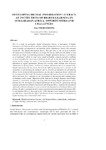| dc.description.abstract | This is a study on developing digital information literacy at institutions of higher learning in sub-Saharan Africa and how digital information literacy may play a role in socio-economic development in sub-Saharan Africa. Information literacy has changed drastically. The digital information literacy that may play a role in socio-economic development in sub-Saharan Africa is no longer the literacy defined as the ability to read and write at a basic level and sign a document. Digital information literacy is now defined as an individual’s ability to read, write, speak in English, compute and solve problems at levels of proficiency necessary to function on the job, in the family of the individual and in society at large. As society is moving from information age to digital age, new definitions of digital information literacy are evolving which include how to access information in digital formats, and how to evaluate information and use it appropriately. Digital information literacy forms the basis for lifelong learning and is common to all disciplines, to all learning environments and to all levels of education. In sub-Saharan Africa, levels of digital information literacy are low due to numerous factors which will be investigated in this study. Development of digital information literacy in sub-Saharan Africa has been slow compared to the development of information and communication technologies in the region. Objectives of the study are to identify obstacles which hinder students at institutions of higher learning from developing digital information skills; find out how the development of digital information literacy may be speeded up among students at institutions of higher learning in sub-Saharan Africa; establish the role digital information literacy may play in socio-economic development in sub-Saharan Africa; and in sub-Saharan Africa. A thorough review of the literature was conducted and whenever possible those responsible for digital information literacy programmes at institutions of higher learning were contacted for their views. | en_US |

